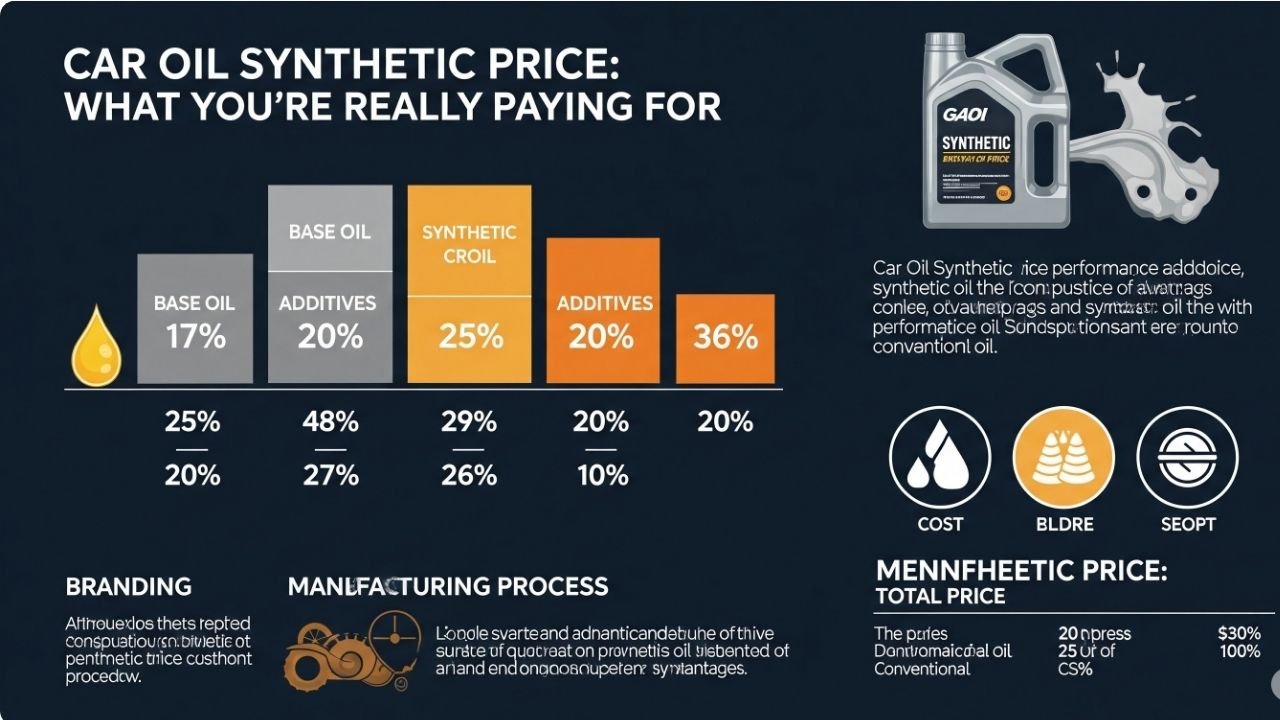Car Oil Synthetic Price: What You’re Really Paying For

We’ve all been there—standing in front of the auto parts aisle or scrolling online, staring at a dozen different bottles of synthetic car oil, each with its own label, price tag, and promises. Some cost twice as much as others. You pause. You wonder—why is synthetic oil so expensive? Is it really worth the extra bucks?
The truth is, car oil synthetic price isn’t just about what’s in the bottle. It’s about technology, performance, longevity, and sometimes even marketing. In this article, we’ll dive deep into what affects the price of synthetic oil, compare it with conventional oil, decode the labels, and help you understand if you’re making a wise choice.
Whether you’re a daily commuter, a weekend road-tripper, or someone who just wants your car to feel smoother and last longer, this guide is for you. Buckle up—we’re about to make motor oil make sense.
In This Article
- 1 What Is Synthetic Car Oil, Really?
- 2 Why Is Synthetic Oil So Expensive? A Deeper Look
- 3 How Much Does Synthetic Oil Cost? (With Table)
- 4 Does Brand Affect Car Oil Synthetic Price? Absolutely.
- 5 Synthetic vs. Conventional Oil: Which One Is Right for You?
- 6 What Impacts Car Oil Synthetic Price in Different Regions?
- 7 Can Using Synthetic Oil Save You Money in the Long Run?
- 8 How to Find the Best Synthetic Oil at the Right Price
- 9 Synthetic Blend vs. Full Synthetic: A Middle Ground Option?
- 10 Does Synthetic Oil Affect Engine Warranty?
- 11 Does Expensive Synthetic Oil Always Mean Better Performance?
- 12 FAQs on Car Oil Synthetic Price
- 12.1 1. Why is synthetic oil more expensive than conventional oil?
- 12.2 2. How often should I change synthetic oil?
- 12.3 3. Is synthetic oil better for older cars?
- 12.4 4. Can I switch back to conventional oil after using synthetic?
- 12.5 5. Are store-brand synthetic oils safe?
- 12.6 6. How do I know which synthetic oil is right for my car?
- 12.7 7. Does synthetic oil expire?
- 12.8 8. Can synthetic oil really improve fuel economy?
- 13 Final Thoughts: Is the Car Oil Synthetic Price Worth It?
What Is Synthetic Car Oil, Really?
At its core, synthetic oil is man-made. But don’t let that throw you off—it’s more like gourmet cooking than fast food. While conventional oil is refined from crude oil, synthetic oil is chemically engineered for better lubrication, higher temperature tolerance, and longer life.
Here’s why it stands out:
- Designed to be more uniform at a molecular level.
- Handles extreme weather better (both hot and cold).
- Keeps your engine cleaner by resisting sludge.
- Can last up to 10,000 to 15,000 miles between oil changes.
In short, synthetic oil is like the premium skincare for your engine—it protects, enhances, and extends life. That’s where the car oil synthetic price starts to make sense. But it’s not just about quality. Let’s break down the price factors.
Why Is Synthetic Oil So Expensive? A Deeper Look
The first time I paid $60 for a full synthetic oil change, I flinched. But after understanding the why, it felt more like an investment. The price of synthetic oil is driven by several layers:
1. Research & Development Costs
Unlike conventional oil that is just cleaned-up crude, synthetic oils are engineered. Companies invest heavily in labs, testing engines, additives, and formulations that reduce wear and tear on your car.
2. Base Oil Quality
Synthetic oil uses Group III, IV, or V base stocks, which are far more refined and consistent than conventional Group I or II oils. This enhances performance but also bumps up cost.
3. Additive Packages
To meet engine requirements, synthetic oils include detergents, dispersants, antioxidants, and anti-wear agents. These additives are tailored to modern engines, especially those with turbochargers or high compression.
4. Marketing and Branding
Let’s be honest—part of what you pay for is the label. Big brands like Mobil 1, Castrol Edge, or Valvoline spend millions on advertising and endorsements. That cost trickles down to the bottle.
So yes, the car oil synthetic price reflects more than just oil—it’s a cocktail of science, precision, and promise.
How Much Does Synthetic Oil Cost? (With Table)
To make things simpler, here’s a general comparison between conventional, synthetic blend, and full synthetic oils across various brands in 2025:
| Type | Price per Quart (USD) | Average Oil Change (5 Quarts) | Oil Change Interval |
|---|---|---|---|
| Conventional Oil | $4 – $6 | $20 – $30 | 3,000 to 5,000 miles |
| Synthetic Blend | $6 – $9 | $30 – $45 | 5,000 to 7,500 miles |
| Full Synthetic Oil | $9 – $15 | $45 – $75 | 7,500 to 15,000 miles |
Key Takeaways:
- Higher upfront cost doesn’t always mean higher overall expense.
- You save on fewer oil changes per year.
- Better for high-mileage, performance, or newer engines.
Does Brand Affect Car Oil Synthetic Price? Absolutely.
Let’s talk about the big names. I’ve personally tried several brands—from budget synthetics to premium ones—and yes, there’s a difference, both in feel and function.
Common Brands & Their Approximate Price per Quart:
- Mobil 1 Advanced Full Synthetic – $11 to $13
- Castrol Edge Extended Performance – $10 to $12
- Valvoline Advanced – $9 to $11
- Amazon Basics Full Synthetic – $7 to $9
- Kirkland (Costco) – $6 to $8
So, if you’re asking why is there such a price gap between Mobil 1 and Amazon Basics, the answer is mostly in additive quality, brand trust, and testing data.
But remember—just like buying clothes, expensive doesn’t always mean better. Sometimes you’re paying for the logo. Read the label, check for API certification, and ensure it meets your car’s requirements.
Synthetic vs. Conventional Oil: Which One Is Right for You?
This is like choosing between filtered tap water and mineral water. Both hydrate, but one might taste cleaner and last longer in your system.
Let’s compare in bullet points:
Conventional Oil:
- Lower upfront cost
- Needs changing every 3,000 to 5,000 miles
- Creates more sludge over time
- Less effective in extreme weather
Synthetic Oil:
- Higher car oil synthetic price
- Lasts 2x to 3x longer between changes
- Reduces engine wear
- Ideal for modern, high-performance engines
If you live in areas with extreme cold or heat, drive long distances, or own a newer car, full synthetic oil is worth every penny.
What Impacts Car Oil Synthetic Price in Different Regions?
When I moved from the Midwest to the West Coast, I was shocked that an oil change went from $45 to $90. Geography plays a role in pricing due to:
- Shipping & logistics
- Regional taxes
- Local labor rates
- Brand availability
For example, in urban cities like Los Angeles or New York, synthetic oil changes can be $20 to $30 more than in small towns. DIYers can save a lot, but even buying a jug online might cost more due to shipping fees or stock shortages in certain climates.
Also, in countries like Canada or the UK, synthetic oil costs are higher due to import duties and regulations.
So next time you see a synthetic oil change price jump in your area, remember—it’s not just about the oil. It’s about the whole delivery system.
Can Using Synthetic Oil Save You Money in the Long Run?
At first glance, synthetic oil seems like a wallet-drainer. But let’s step back and think in terms of long-term value. While the car oil synthetic price is undeniably higher per bottle, it doesn’t necessarily mean you’re spending more overall.
Let’s break it down:
1. Fewer Oil Changes
Synthetic oil lasts 2x to 3x longer than conventional. If you’re changing oil every 3,000 miles with conventional, but every 10,000 with synthetic, that’s fewer visits to the shop, less labor cost, and less time wasted.
2. Better Fuel Economy
Because synthetic oil flows more efficiently, it reduces friction. This helps your engine run smoother, which can improve your MPG slightly. It might not sound like much, but over a year, the savings add up.
3. Engine Protection
Synthetic oil provides better protection against heat, deposits, and sludge, especially in turbocharged or direct-injection engines. Long term, this means fewer repairs, better performance, and a healthier resale value for your car.
So yes, despite the higher car oil synthetic price, it often pays for itself through fewer oil changes, better fuel efficiency, and reduced engine wear.
How to Find the Best Synthetic Oil at the Right Price
With so many options, how do you choose the right oil without overspending? Here’s how I personally shop smart:
Look for API and SAE Certifications
Always check for API SN, SP, or ILSAC GF-6 certifications. These ensure the oil meets industry standards.
Buy in Bulk
If you do your own oil changes, buy synthetic oil in 5-quart jugs instead of single quarts. It’s much cheaper per unit.
Use Coupons or Promotions
Major brands frequently run rebates or bundle deals. A $10 mail-in rebate on a 5-quart jug is common.
Stick to Your Vehicle’s Needs
Don’t buy “racing oil” if you’re just commuting. Follow your owner’s manual and don’t overpay for features you don’t need.
Check Wholesale Clubs or Online
Places like Costco, Walmart, and Amazon offer amazing deals. Even warehouse brands like Kirkland Synthetic Oil are getting great reviews—for almost half the price of big brands.
Here’s a simple tip I live by: Pay for what matters, not just the label.
Synthetic Blend vs. Full Synthetic: A Middle Ground Option?
If you’re stuck between budget and performance, there’s a compromise—synthetic blend. It mixes conventional oil with some synthetic base oil. Let’s compare them:
| Feature | Synthetic Blend | Full Synthetic |
|---|---|---|
| Price per Quart | $6–$9 | $9–$15 |
| Oil Change Interval | 5,000–7,500 miles | 7,500–15,000 miles |
| Engine Protection | Moderate | High |
| Performance in Extreme Temps | Good | Excellent |
While synthetic blends still offer many benefits, they don’t go the full distance. For cars with turbo engines, full synthetic is often non-negotiable.
Does Synthetic Oil Affect Engine Warranty?
This question comes up a lot—and it’s an important one. The short answer? Yes, it can protect your warranty—but only if used correctly.
Here’s What to Know:
- If your car requires full synthetic oil and you use conventional instead, your warranty can be voided.
- Always follow the OEM (Original Equipment Manufacturer) recommendations.
- Keep receipts of oil changes—whether DIY or professional—for proof in case of claims.
- Most manufacturers now recommend or require synthetic oil due to tighter engine tolerances.
So using the right synthetic oil may not only improve your engine’s health but also protect you legally. And that peace of mind? Priceless.
Does Expensive Synthetic Oil Always Mean Better Performance?
You’d think the pricier the bottle, the better the oil, right? Not always. Sometimes you’re just paying for advertising, racing endorsements, or fancy packaging.
In real-world use, many budget synthetic oils perform just as well as premium brands—especially when they meet industry certifications.
Think of it like choosing bottled water. Some brands sell for $1, some for $5—but both are still clean, drinkable water. The key is what’s inside and whether it suits your engine’s needs.
So while the car oil synthetic price varies, don’t assume high price = high quality. Always read reviews and check third-party lab tests when possible.
FAQs on Car Oil Synthetic Price
1. Why is synthetic oil more expensive than conventional oil?
Because it’s engineered in labs, with higher-grade base oils and specialized additives. It also undergoes more testing and quality control.
2. How often should I change synthetic oil?
Most cars recommend between 7,500 to 15,000 miles, depending on driving conditions and oil quality.
3. Is synthetic oil better for older cars?
Yes, especially high-mileage synthetic oils, which are designed to reduce leaks and sludge buildup in aging engines.
4. Can I switch back to conventional oil after using synthetic?
Yes, but it’s not recommended if your engine is designed for synthetic. Switching may reduce performance or cause issues over time.
5. Are store-brand synthetic oils safe?
Absolutely, as long as they meet API or SAE standards. Brands like Kirkland or Amazon Basics often perform well in tests.
6. How do I know which synthetic oil is right for my car?
Check your owner’s manual. It will tell you the viscosity (like 5W-30) and whether synthetic oil is required.
7. Does synthetic oil expire?
Yes, though it takes a long time. Most synthetic oils last up to 5 years unopened and 1-2 years once opened.
8. Can synthetic oil really improve fuel economy?
It can—by reducing engine friction and improving efficiency, especially in cold weather starts.
Final Thoughts: Is the Car Oil Synthetic Price Worth It?
Let me be real with you. The first time I switched to full synthetic oil, I did it grudgingly—$70 for an oil change? No thanks! But three months later, I noticed something. My car started faster in the morning, ran smoother on the highway, and the mileage? Definitely better.
The car oil synthetic price may seem steep upfront, but it’s one of the smartest investments you can make for your vehicle. Like eating healthy food or wearing sunscreen, the payoff isn’t instant—but it’s real and lasting.
You don’t need the most expensive bottle on the shelf. You just need the right oil for your engine, changed at the right interval, with a bit of attention to quality.
So next time you’re in the aisle or clicking “Add to Cart,” ask yourself—not what’s the cheapest, but what’s best for your engine in the long run.






